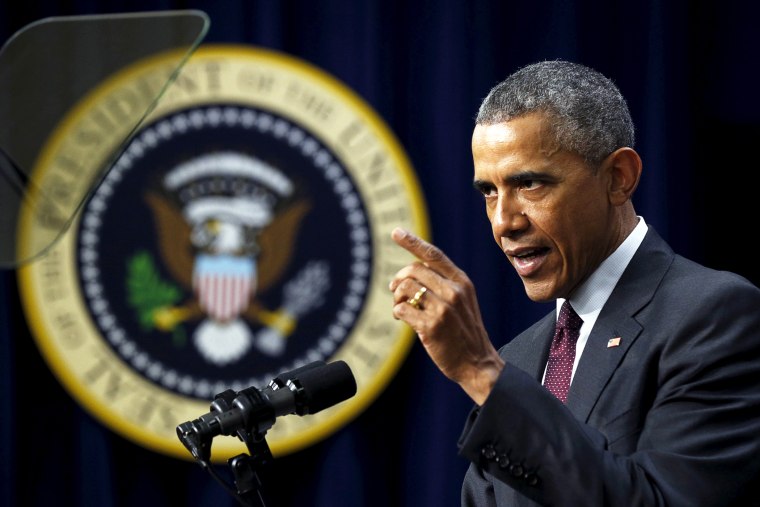As the debate over the international nuclear agreement with Iran intensifies, President Obama
addressed the VFW National Convention yesterday, making a point about the Iran deal's critics that too often gets overlooked.
"In the debate over this deal, we're hearing the echoes of some of the same policies and mindset that failed us in the past. Some of the same politicians and pundits that are so quick to reject the possibility of a diplomatic solution to Iran's nuclear program are the same folks who were so quick to go to war in Iraq, and said it would take a few months. And we know the consequences of that choice and what it cost us in blood and treasure. 'So I believe there's a smarter, more responsible way to protect our national security -- and that is what we are doing. Instead of dismissing the rest of the world and going it alone, we've done the hard and patient work of uniting the international community to meet a common threat. Instead of chest-beating that rejects even the idea of talking to our adversaries -- which sometimes sounds good in sound bites, but accomplishes nothing -- we're seeing that strong and principled diplomacy can give hope of actually resolving a problem peacefully."
There can be no doubt that as arguments on Capitol Hill grow louder, opponents of the diplomatic agreement will have a more expensive lobbying campaign. What they'll lack, however, is credibility.
Here's a challenge for everyone involved in the debate: find one prominent voice who wants to kill the Iran deal who was right about the war in Iraq. Just one. It's a strikingly difficult task -- I've been looking for a while and I've come up empty -- which reinforces a broader point.
It's a quaint, almost inconvenient, approach to Beltway arguments, but credibility and accountability should probably count for something in debates like these. When a group of discredited conservatives fail miserably on matters of national security and foreign policy over the course of several years, and literally those same people tell the nation, "Trust us as we try to push the United States closer to yet another war in the Middle East," it's not unreasonable to think Americans should consider their track record.
As for what Republicans should be saying, the
Washington Post's Greg Sargent had an
interesting conversation yesterday with Matt Dowd, a former top strategist for President George W. Bush, who presented a more responsible argument that GOP officials and candidates will almost certainly ignore.
"If I were advising a presidential candidate, I'd tell him to argue that now that we have an agreement in place, it's better to elect the person who'd be toughest on Iran," Dowd said. "A Republican is going to be much tougher on Iran than Hillary or any other Democrat would be." GOP primary voters might balk at anything that stops short of a full blown pledge to roll back Obama's policies, of course. But Dowd questioned whether GOP candidates have to shape everything around that notion.
It would require a reflex adjustment -- in debates like these, Republicans instinctively think, "Destroy," not "Govern." But Dowd's point is nevertheless sound. Effective implementation of the international agreement will require the United States to be vigilant and assiduous. There's ample room for a grown-up GOP candidate to tell voters that he or she, more than the other candidates, is best suited to follow through.
But the political reality is this will remain a pipe dream. Knee-jerk opposition to diplomatic solutions is simply too fierce, and any candidate who even considered such an approach would effectively end their campaigns.
